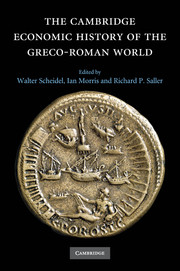Book contents
- Frontmatter
- 1 Introduction
- Part I Determinants of Economic Performance
- Part II Early Mediterranean Economies and the Near East
- Part III Classical Greece
- Part IV The Hellenistic States
- Part V Early Italy and the Roman Republic
- Part VI The Early Roman Empire
- Part VII Regional Development in the Roman Empire
- Part VIII Epilogue
- Bibliography
- Index
- Map 1.1 The Mediterranean basin"
- Map 10.1 Greek and Phoenician trade in the period of the Persian Wars"
- Map 11.1 The Achaemenid empire"
- Map 12.1 Greece and Asia Minor"
- Map 15.1 The Seleucid empire"
- Map 16.1 Greco-Roman Egypt"
- Map 20.1 The Roman empire at the accession of Vespasian"
- References
1 - Introduction
Published online by Cambridge University Press: 28 March 2008
- Frontmatter
- 1 Introduction
- Part I Determinants of Economic Performance
- Part II Early Mediterranean Economies and the Near East
- Part III Classical Greece
- Part IV The Hellenistic States
- Part V Early Italy and the Roman Republic
- Part VI The Early Roman Empire
- Part VII Regional Development in the Roman Empire
- Part VIII Epilogue
- Bibliography
- Index
- Map 1.1 The Mediterranean basin"
- Map 10.1 Greek and Phoenician trade in the period of the Persian Wars"
- Map 11.1 The Achaemenid empire"
- Map 12.1 Greece and Asia Minor"
- Map 15.1 The Seleucid empire"
- Map 16.1 Greco-Roman Egypt"
- Map 20.1 The Roman empire at the accession of Vespasian"
- References
Summary
We have two goals in this book: to summarize the state of knowledge in ancient Greek and Roman economic history, and to contribute to shaping future research. The book is the first of its kind. The original Cambridge Economic History of Europe began with the decline of the Roman empire; and in the seventy years since its first volume appeared there has been no single-volume overview of Greco-Roman economic history to complement it. From one perspective, that is hardly surprising. Most ancient historians rely on literary sources produced by and for a leisured elite. These say notoriously little about economics, and the corpus of texts has barely expanded since the Cambridge Economic History of Europe was published. But experts in the field know that this perspective is misleading. The publication of huge numbers of inscriptions, papyri, coins, and mute archaeological data has transformed scholarship in the last two generations, and Greco-Roman economic historians are now asking new questions and using new methods to answer them. But their advances are as yet barely known outside the specialist community. We hope that this Cambridge Economic History of the Greco-Roman World will simultaneously help students of classical culture understand the material forces that made the Greeks’ and Romans’ cultural achievements possible and allow economic historians of other times and places to fit the Greco-Roman experience into the broader sweep of world economic history.
- Type
- Chapter
- Information
- Publisher: Cambridge University PressPrint publication year: 2007
References
- 14
- Cited by

